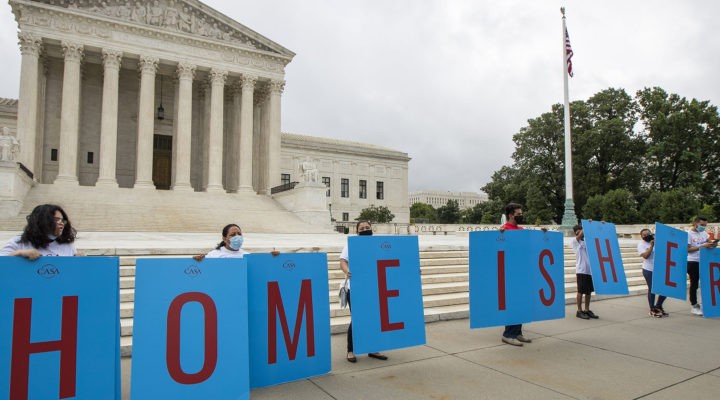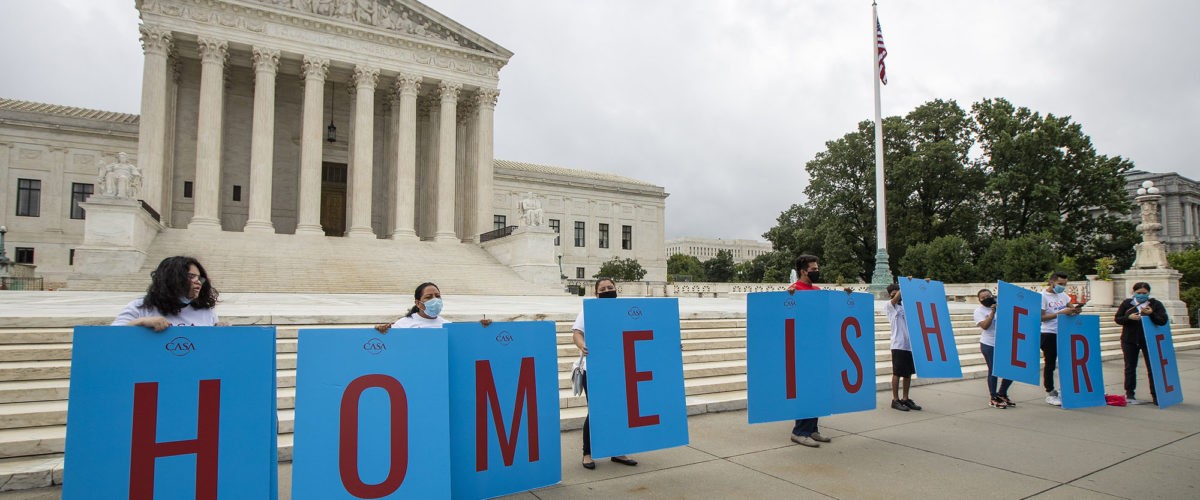The Biden Administration isn’t waiting for Congress to act before working to strengthen DACA, the Obama-era program that provides legal residency to immigrants who came to the U.S. as children, a high-ranking federal immigration official said during a May 17 virtual gathering of faith-based legal services providers.
“We are actually working to fortify and preserve DACA as directed by a presidential memo that was signed on Jan. 20,” said Felicia Escobar Carrillo, chief of staff in the office of the director of the U.S. Citizenship and Immigration Services, the agency that oversees American immigration policy. “One of the things we’re thinking hard about is how to preserve the program via regulatory policy.”

Felicia Escobar Carrillo
She spoke during CLINIC Convening 2021, the annual gathering of the Catholic Legal Immigration Network, whose 380 members in 49 states provide affordable legal representation to immigrants. The meeting is virtual this year and runs through May 20.
Carrillo, a San Antonio, Texas, native and attorney who previously worked on immigration issues under President Barack Obama, covered a wide range of issues during her address and subsequent question-and-answer session, from asylum seeker and U.S. citizenship application backlogs to the impact of the COVID-19 pandemic and Trump administration policies on the nation’s immigration policies.
When asked about DACA, the acronym for Consideration of Deferred Action for Childhood Arrivals, Carrillo said she wanted to assure the gathering that authorities are moving at all possible speed to preserve the policy, which survived a Trump administration attempt to terminate it through presidential memo.
The president has met with Dreamers — the name given child immigrants who have grown up in the U.S. — as a signal of support for immigration reform and for DACA while pressing USCIS and other agencies to develop regulations to preserve the program.
“We have folks on our team who are working around the clock on that with DHS (Department of Human Services) and DOJ (Department of Justice) to move forward,” she said. “It should be coming soon. It’s something that we are committed to getting done within months, not years, because we know how important the program is. That’s really at the top of our list.”
“It’s something that we are committed to getting done within months, not years, because we know how important the program is.”
After a federal court order in December, USCIS began accepting DACA applications and renewal requests and continues to move forward with that process, Carrillo said.
The agency also is attempting to address the backlog of asylum cases, which Human Rights First reports to have reached 386,000 by 2020.
“The backlog is certainly a challenge,” she said. “That began to creep up in the Obama administration years.”

Immigrant activists and their supporters link hands in the middle of Washington, D.C.’s Constitution Avenue on April 28, 2021, stopping traffic for about an hour. United We Dream, the nation’s largest immigrant youth advocacy group, demanded U.S. President Joe Biden halt all deportations, end border detentions and deliver a broad pathway to citizenship on the eve of his hundredth day in office. (Photo by Alejandro Alvarez/Sipa USA)(Sipa via AP Images)
In part, this is due to a workforce issue because more adjudicators have to be hired to move through the applications at greater speed. “That is something we’ve been pretty focused on for the last several months, while at the same time other folks (asylum seekers) are coming in,” Carrillo said. “So, we’re looking to make sure we have the capacity to grow the staff that we need to actually get through the backlogs.”
According to a 2020 USCIS report to Congress, the agency also faces a significant accumulation of citizenship applications, then reported at 652,431.
While pre-existing policies contributed to the red tape, so did the COVID-19 pandemic, as the agency suspended in-person services for three months last year.
But an ongoing expansion of staff and operating hours is starting to take a bite out of the logjam, she added. “One result of these and other measures is that the level of pending naturalization applications, while still certainly higher than we would like, has fallen by approximately 100,000 cases since January. Staff is working tirelessly to address processing delays and backlogs.”
It’s also hoped that the U.S. Citizenship Act of 2021, which Biden submitted to Congress in February, will streamline the process for those seeking a new life in the United States. “Its focus is on providing pathways to citizenship, strengthening labor protections, prioritizing smart border control and addressing the root causes of migration to the United States,” Carrillo said.
But it will be new laws, not regulations or executive orders, that will make U.S. immigration policy more just and efficient, she said. “Legislative reform is our best path forward to fixing our immigration system, and only Congress can pass immigration reform.”
“Legislative reform is our best path forward to fixing our immigration system, and only Congress can pass immigration reform.”
In the meantime, the USCIS will be working publicly to educate immigrants about the programs available to them, and to improve procedures.
This year, the agency has held listening sessions with international students and with immigrants on applying for Temporary Protective Status and about eligibility for other programs, she said.
Community relations campaigns are being planned and appeals are being made through government publications, like the Federal Register, seeking input on the issues from those who care about immigration.
Outreach also will be happening online, she said. “I think there are some silver linings to this crazy year we’ve lived in terms of virtual engagement in a more robust way.”
Related articles:
A bipartisan immigration bill has been introduced, but will it garner bipartisan support?
Panelists debate how to ‘normalize’ immigration after ill effects of Trumpism
What would happen if immigration policies were based on majority opinion in the U.S.?
Faith leaders express joy as Biden finally raises ceiling for refugee admissions to 62,500


